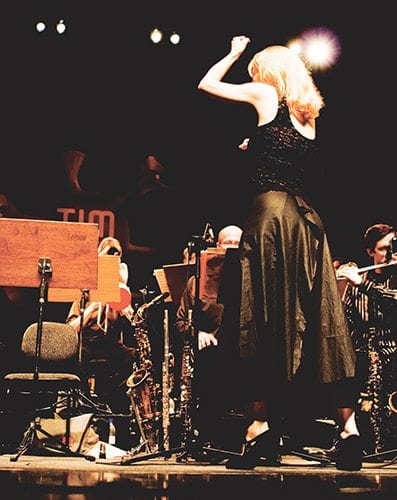
Hang gliding over Rio; listening to birds singing; and gazing across wind-swept prairies are all experiences that jazz composer and big band leader Maria Schneider turns into music with her 18-member band, the Maria Schneider Orchestra. Its signature sound — sensuous and swinging orchestral works that combine oceanic swells of harmony with lyrical solos — often conjure the landscapes and memories of her small, rural hometown, Windom, Minn.
Schneider, 53, will conduct her orchestra on Saturday, April 26, at the Berklee Performance Center, in a Celebrity Series of Boston presentation. She will also join a free, student-run panel on the future of jazz composition at Berklee’s Café 939 on Thursday, April 24, at 12:30 p.m., with Terence Blanchard, Billy Childs, Patrice Rushen and Geri Allen.
“Most of my music is story telling,” says Schneider, on the phone last week from her apartment in Manhattan. “What I love about my performances with my band, what people respond to, is what the musicians put into the music that’s theirs and in the end becomes ours. My musicians complete the story of the music.”
When her soloists improvise, Schneider says, “It’s not about them being technically adept over the top of the music. It’s about them making the music feel inevitable and seamless, creating the circle of beauty.”
Schneider’s musical journey has taken her beyond her Minnesota start, but she brings along her past. “I don’t think that ever goes away for anybody,” says Schneider of her connection with hometown memories. “It’s your first orientation to everything.”
These memories include flying over the prairies with her father, who worked for a company that that gave him a plane to cross the Dakotas. “There was no other way to get around,” says Schneider.
Schneider blends improvisation, swing and symphonic richness to tell her stories. At times, she draws from realms beyond jazz, including the samba and classical music.
Among her Grammy-winning albums is “Winter Morning Walks” (2014), a collaboration with soprano singer Dawn Upshaw inspired by two revered poets of place, Carlos Drummond de Andrade of Brazil and fellow Midwesterner Ted Kooser, a Pulitzer Prize winner and former U.S. Poet Laureate.
Reflecting on both her music and her upbringing, Schneider’s early connections with nature and a close-knit, rural community influence her approach to composing, conducting and managing a livelihood.
“It’s important to me that my music speaks intelligibly to people,” says Schneider. “Music can have intricacy and complexity, but also draw people in. I come from a world of regular folks, unpretentious people — so many of my compositions are dedicated to its places and people.”
Many members of her orchestra have performed with her for decades. “Composing can be very isolating,” says Schneider. “But I have my band — my own little community of wonderful, crazy people.”
Schneider started early on her musical journey. “Even as a kid, I was attracted to orchestration,” she says. “I love things that are big and flamboyant — the colors, all the choices.”
At age 5, she found the woman who would become her music teacher for 13 years, Evelyn Butler. In the liner notes of her first album, Schneider writes of learning jazz and music theory from this “dynamic, redheaded classical and stride jazz pianist who blew into in my hometown from Chicago. Smitten from the first moment I heard her lay into a keyboard, I had to study with her.”
Schneider obtained a bachelor’s degree in music from University of Minnesota and later, a master’s of degree in music from the Eastman School of Music. In 2012, her alma mater awarded her an honorary doctorate.
In 1985, Schneider moved to New York City and found a mentor in Gil Evans, whose orchestrations include three of Miles Davis’ finest albums: “Miles Ahead” (1957), “Porgy and Bess” (1958) and “Sketches of Spain” (1960).
Schneider worked for Evans during the last three years of his life, assisting him on arrangements. After his death in 1988, she formed the Maria Schneider Orchestra. From 1993 to 1998, they had a standing Monday night gig at a Greenwich Village jazz club. In 1994, they recorded their first album, “Evanescence.” Nominated for a Grammy, the debut recording widened their circle of fans.
Three years later, Schneider and her band went on tour in Brazil, an experience that shaped her singular voice as a composer. “Brazil was a big game changer in my music,” says Schneider. “The people, music and culture expressed an alchemy in life that turns struggle and pain into beauty and joy. Tom Jobim and Bach possess the same level of genius. Brazilian music is highly sophisticated, with very intricate, beautiful harmonies, yet very accessible.”
Extending her affinity for community to her business model, Schneider was an early adapter of fan-funding, which lets musicians control marketing and sales and keep profits that otherwise go to a record company. “It’s the only way now,” says Schneider. “I’m so glad I’ve spent last 10 years developing that.”
Schneider uses the website and record label ArtistShare to engage her fan base. Her 2004 album “Concert in the Garden” was the label’s first release and the first recording to win a Grammy with Internet-only sales. Supporters invest from $12.95 to $10,000 or more to preorder a new album and receive perks that vary in scale, from videos and blogs charting the creative process to VIP events.
At Berklee, Schneider and her band will play selections from albums that span two decades as well as yet-unrecorded pieces.






